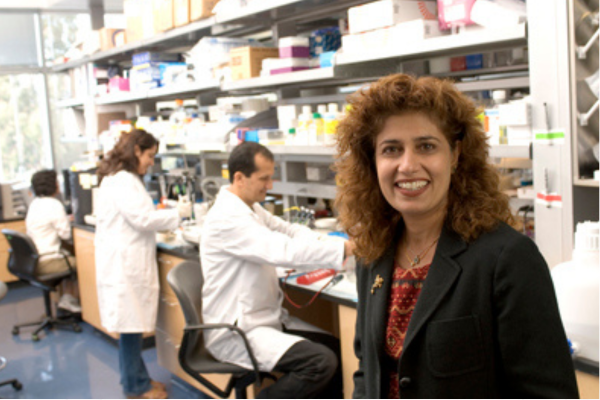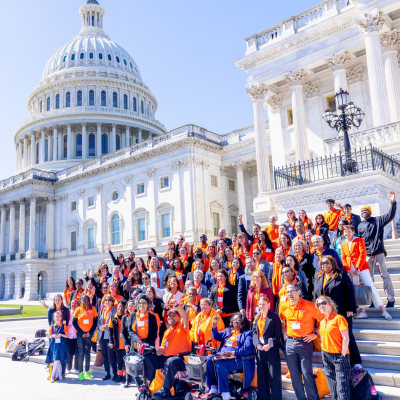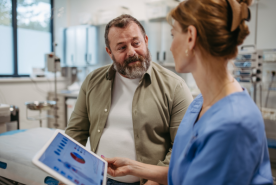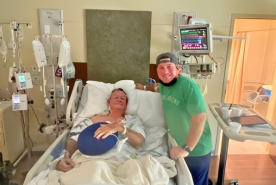May 20, 2025
Learn how Dr. Minnie Sarwal is shaping transplant care with research, innovation, and a lifelong dedication to saving lives.
Image Credit: Organ Transplant Kids Can Thrive Without Toxic Anti-rejection Drugs, Study Finds, 2008
Dr. Minnie M. Sarwal is a pioneering adult and pediatric nephrologist (kidney doctor) and researcher who continues to shape the future of transplant and kidney care. She’s helped create life-saving diagnostic tests and changed how doctors spot and treat kidney transplant rejection. Thanks to Dr. Sarwal’s work, more people get the care they need to protect their transplants and live longer, healthier lives.
About Dr. Minnie M. Sarwal
Dr. Sarwal received her medical degree from Calcutta Medical College in India before completing her residency and fellowship in the UK. She then earned a Ph.D. in molecular genetics at Cambridge University, where she worked alongside Nobel-prize winner Sydney Brenner. Dr. Brenner is known for discovering how genes regulate organ development and program cell death.
Today, Dr. Sarwal is a professor at the University of California, San Francisco, where she leads a lab focused on advancing care for transplant recipients. She has published over 300 papers and received numerous awards.
Here are five of Dr. Sarwal’s top achievements in the field.
1. Helped Kids Avoid Steroids After Transplants
Before the early 2000s, children who received transplants took steroids to prevent their bodies from rejecting the new kidney. But steroids in children can cause serious side effects like weight gain, high blood pressure, and weak bones.
Dr. Sarwal was determined to find a better way. She led the first successful U.S. study designed to help children avoid steroids after a kidney transplant.
Her research found that:
- Alternative medications can work: New immune-suppressing drugs could prevent rejection.
- Children had better health outcomes: Kids who didn’t take steroids had fewer problems with healthy growth and other health issues and enjoyed a better quality of life.
- Kidneys stayed healthy: The transplant success rate remained strong with these newer treatments.
Children now receive immunosuppressants that prevent rejection with fewer long-term health complications.
2. Made a Blood Test to Detect Rejection Early
Dr. Sarwal co-founded a company that uses advanced technology to improve organ transplant care. One of her breakthroughs is the kSORT blood test, which helps doctors detect rejection early without a biopsy.
The kSORT test can:
- Detect rejection early: kSORT finds warning signs in the blood before symptoms appear.
- Reduce the need for biopsies: A blood test is safer and more comfortable.
- Personalize transplant care: The test helps doctors tailor medications based on each person’s risk of rejection.
kSORT is now helping people with kidney and heart transplants have better outcomes.
3. Studied a Virus That Can Harm Kidney Transplants
Dr. Sarwal led a major NIH-funded study to learn how the cytomegalovirus (CMV) affects kidney transplant patients.
CMV is related to the herpes virus. Like herpes, it is often harmless unless someone has a weakened immune system. Before this study, doctors didn’t fully understand how CMV might impact transplant rejection.
Her discoveries showed that:
- CMV can trigger rejection: The virus may directly activate the immune system in ways that harm the new kidney.
- Early warning signs exist: Certain immune markers linked to CMV can predict rejection.
- Personalized treatment is key: Patients with past or active CMV may need closer monitoring or adjusted medications.
This research changed how doctors screen for and manage CMV in kidney transplant recipients.
Subscribe today!
Join the NKF Blog Newsletter
Get inspirational stories and kidney disease resources delivered to your inbox every month. You'll gain practical insights and expert advice to help you better understand and manage your kidney health, no matter where you are on your kidney journey.
4. Created a Map of Every Kidney Cell
Until recently, doctors didn’t understand the thousands of different cells in a kidney or how they change during disease. Dr. Sarwal helped create the first-ever single-cell map of the human kidney.
Using cutting-edge technology, her team examined thousands of individual kidney cells to track what genes they use and what roles they play.
The map reveals:
- Every cell type in the kidney
- How those cells function in health and disease
- Which cells are involved in rejection, scarring, or healing
This helps researchers target the exact cells causing a problem, offering hope for more precise treatments in the future.
5. Developed a Urine Test to Check Kidney Transplant Health
Dr. Sarwal and her lab developed QSant, a urine test that detects early signs of kidney rejection without a biopsy.
The QSant test:
- Uses a tiny urine sample
- Measures specific molecules related to rejection
- Gives a score that alerts doctors before symptoms appear
Learn More and Get Involved
Dr. Minnie Sarwal’s groundbreaking work is transforming the future of transplant care–and you can too!
Here’s how you can get involved, stay informed, and make a difference with NKF:
- Participate in the KidneyCARE™ Study: Improve kidney research by answering survey questions about your kidney disease experience.
- Join NKF’s Kidney Learning Center: Watch videos made by patients to learn more about kidney disease treatments, kidney transplantation, or living donation.
- Become a Voices for Kidney Health advocate: Use your voice to improve kidney disease and transplant legislation.
Together, we can drive the future of kidney health forward.



















